Kevin Clarke
Operetta Research Center
11 December, 2017
At the beginning of December, the winners of this year’s Bundeswettbewerb Gesang presented themselves at the Friedrichstadt Palast in Berlin, where the young performers received numerous prizes in the category “Musical/Chanson.” Two novelties were the first ever Charles Kálmán Chansonpreis (2,500 Euros) and the prize of the Bar jeder Vernunft, Berlin (also 2,500 Euros). The Kálmán prize is sponsored by the children of Charles Kálmán in honor of their late father’s work as a chanson composer. The first winner is 24 year old Friederike Kury from the Universität der Künste (UdK) in Berlin.
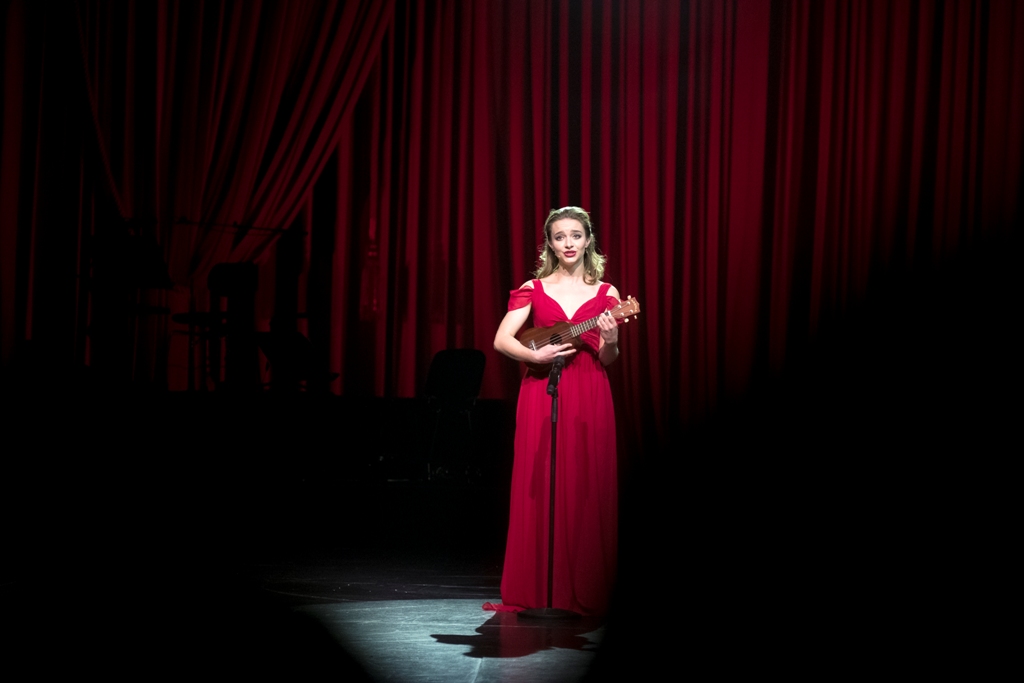
Friederike Kury singing “Mein kleiner grüner Kaktus.” (Photo: Bundeswettbewerg Gesang / Matthias Heyde)
Miss Kury sang a mash-up of Mein kleiner grüner Kaktus (1934) and the wonderful Muppet Show song It’s Not Easy Bein’ Green (1970), a pledge for diversity and accepting yourself as you are. Kury presented it with a little guitar, and demonstrated great restrained stage presence – on the massive stage of the Friedrichstadt Palast. Admittedly, Kury did not bring the magic of a Julie Andrews (or Kermit himself) to the latter number, but she recommended herself as an interesting personality, which (by the way) was true of quite a few performers. Many differed pleasantly from the one-pretty-size-fits-all-roles formula that so many musical comedy youngsters display. A special example of a new way of thinking about this was Sebastian Jüllig from the Hochschule Osnabrück. His decidedly ‘queer’ stage persona gained him the 1st Prize of Berlin’s Mayor (5,000 Euros), and the special Bar jeder Vernunft prize. The latter includes a one-off concert in November 2018 on the stage were – back in 1994 – the legendary Im weißen Rössl was revitalized by the Geschwister Pfister, Max Raabe and many others. (And boy would Mr. Jüllig fit into any White Horse Inn production with his Eddie Cantor qualities!)
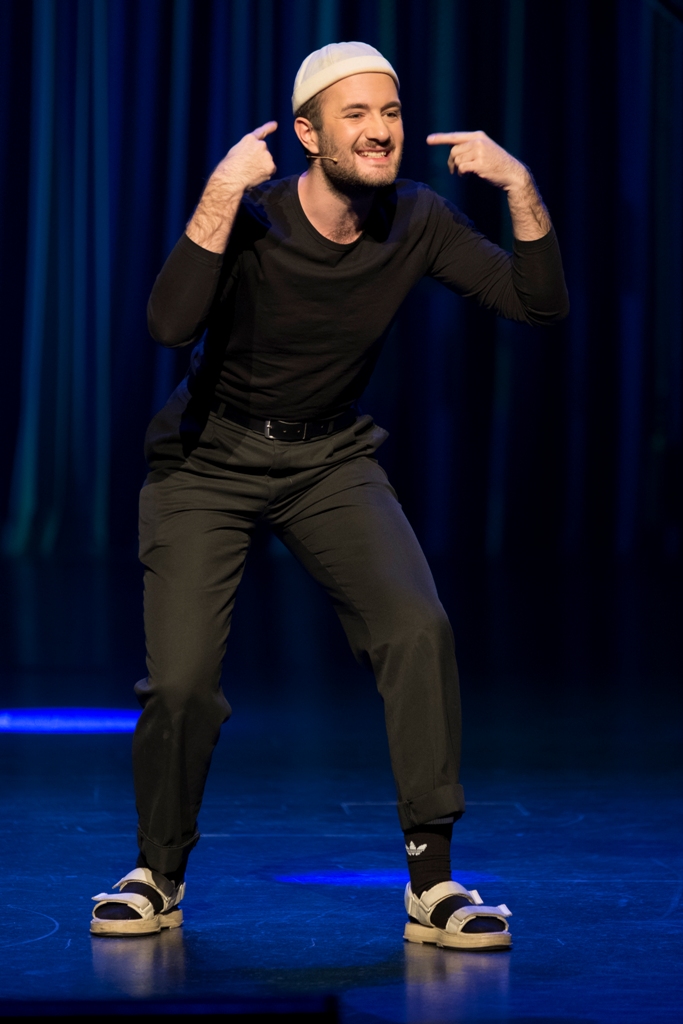
Sebastian Jüllig from Osnabrück. (Photo: Bundeswettbewerg Gesang / Matthias Heyde)
In the audience at Friedrichstadt Palast was Robert Jarczyk-Kálmán, one of Charles Kálmán’s two sons and heirs. He is also in charge of the Emmerich Kálmán estate, together with his aunt Yvonne Kálmán. When I bumped into him at the after-show party, Mr. Jarczyk-Kálmán told me about his reasons for setting up such a chanson prize; he had written down a few lines just in case he’d be called upon to deliver a speech. Here is what he had to say:
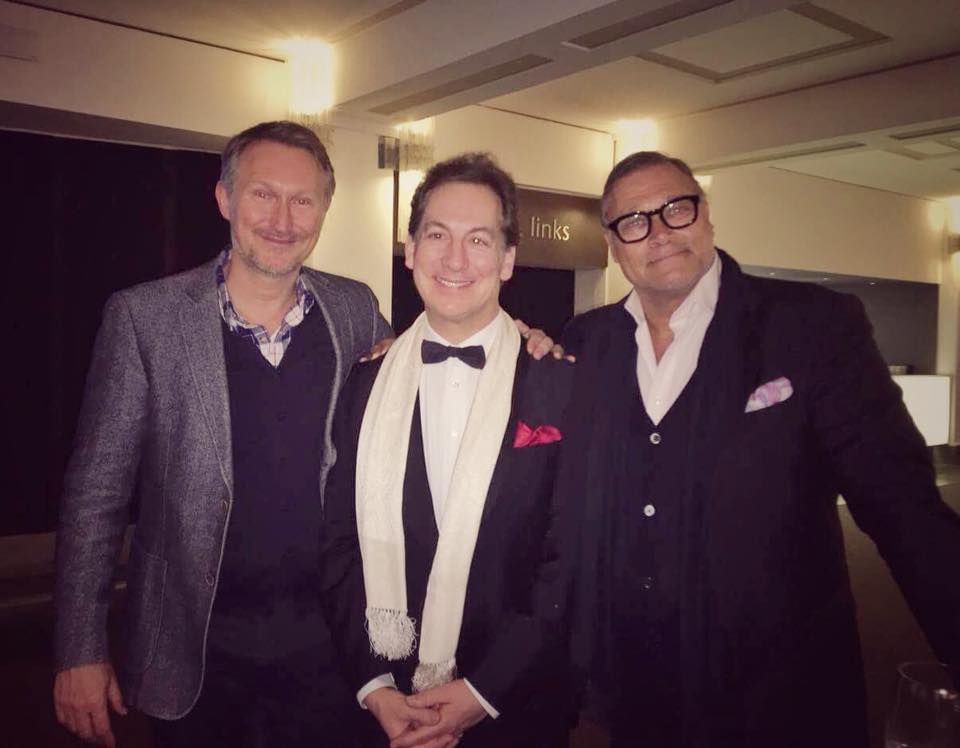
Robert Jarczyk-Kálmán (r.) together with pianist Alexander Frey and the director of the Operetta Research Center, Dr. Kevin Clarke (l.) (Photo: Private)
„Mein Vater Charles Kálmán hat als Sohn des weltberühmten und zurecht so verehren master of music Emmerich Kálmán nicht nur die psychische und physische Entwurzelung durch die Flucht und Emigration nach Amerika ertragen müssen – auch die Entwurzelung seiner musikalischen Identität hat er durch ein [...] umfangreiches [...] Gesamtwerk in den Genres Operette, Musical, Filmmusik, Symphonien, Klavierkonzerte und zu guter Letzt durch ein unwahrscheinlich großes Vermächtnis an Liedern, Liederzyklen und Chansons [...] der Nachwelt hinterlassen, immer auf der Suche nach seiner Identität und seinen Wurzeln!
Durch die wunderbare, einzigartige Ehre in seinem Namen diesen Preis verleihen zu dürfen, hat der Bundeswettbewerb Gesang mit dem Charles Kálmán Preis für Chanson seiner [...] kompositorischen Vielfalt ein Andenken verliehen! Dafür bedanke ich mich, besonders bei Frau Holl und Professor Marianne Larsen!
Die Entdeckung der wild unterschiedlichen Genres in Charles Kálmáns [Oeuvre] wird zukünftigen jungen Künstlern die Gelegenheit geben, sich weiterzuentwickeln!
Charles Kálmán hat einmal in einem Interview gesagt: ‚Ich wurde Charles Kálmán, und das bin ich geblieben!‘ Heute ist er nach lebenslänglicher entwurzelnder Reise beim Bundesgesangswettbewerb angekommen, um jungen Künstlern den Koffer seiner musikalischen Reise in die Hand zu drücken, für deren Reise in eine Zukunft voll musikalischer Kreativität!“
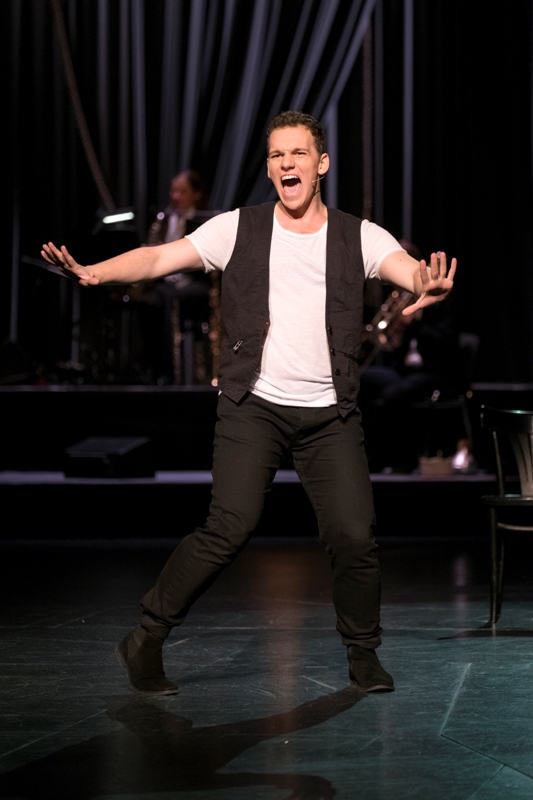
Markus Vetter, who has also performed the role of Edwin in “Csardasfürstin” in the past. (Photo: Bundeswettbewerg Gesang / Matthias Heyde)
And while we’re on the subject of Emmerich Kálmán, who himself was always very close to musical comedy and Broadway in his oeuvre, another winner of the evening, Markus Fetter from the UdK Berlin, listed the role of Edwin in Csardasfürstin in his CV.
So, in a way, the diverse elements came together neatly in this Bundeswettbewerb. And Florian Wagner singing his own chansons to his piano accompaniment would be a superb artist to interpret the witty songs of Charles Kálmán. And suave performers such as Denis Riffel would be perfect to present the Broadway songs Emmerich Kálmán wrote with Lorenz Hart for Miss Underground.

Katharine Mehrling hosting the gala at Friedrichstadt Palast. (Photo: Bundeswettbewerg Gesang / Matthias Heyde)
The hostess of the evening, Katharine Mehrling, recently sang the glorious “Sigh By Night” from Arizona Lady – but originally written with Hart for Miss Underground – at the Komische Oper Berlin in a concert performance of Emmerich Kálmán’s last stage work, which premiered posthumously in 1954. It would be grand if the Charles Kálmán Chanson prize would inspire more so called cross-over activity, bringing operetta together (again) with cabaret, musical comedy, vaudeville and chanson artists.
Next year, the Bundeswettbewerb Gesang will be dedicated to “Opera & Operetta.” In the past, the operetta performances heard in the musical comedy category were far superior to the opera people trying their luck with the genre. But there’s room for both…. And I certainly hope to hear Friederike Kury, Sebastian Jüllig, Florian Wagner and all the others (including Katharine Mehrling) in an operetta production, any time soon.
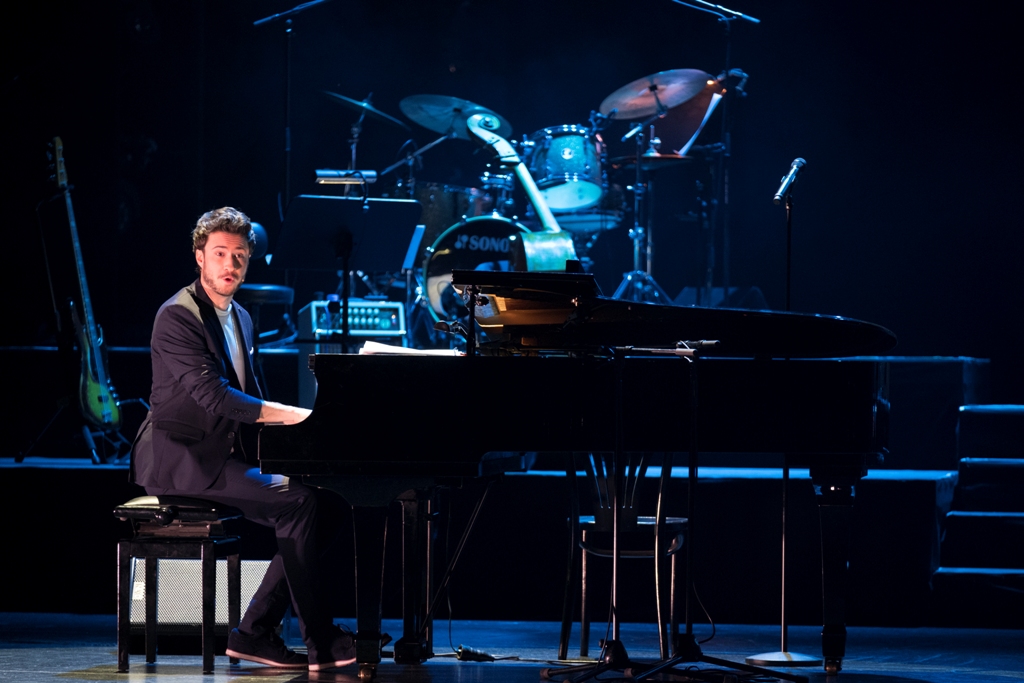
Florian Wagner performing his chanson “Schlechtes Lied.” (Photo: Bundeswettbewerg Gesang / Matthias Heyde)
You can watch performances of all prize winners online here (go to the bottom of the page.)
